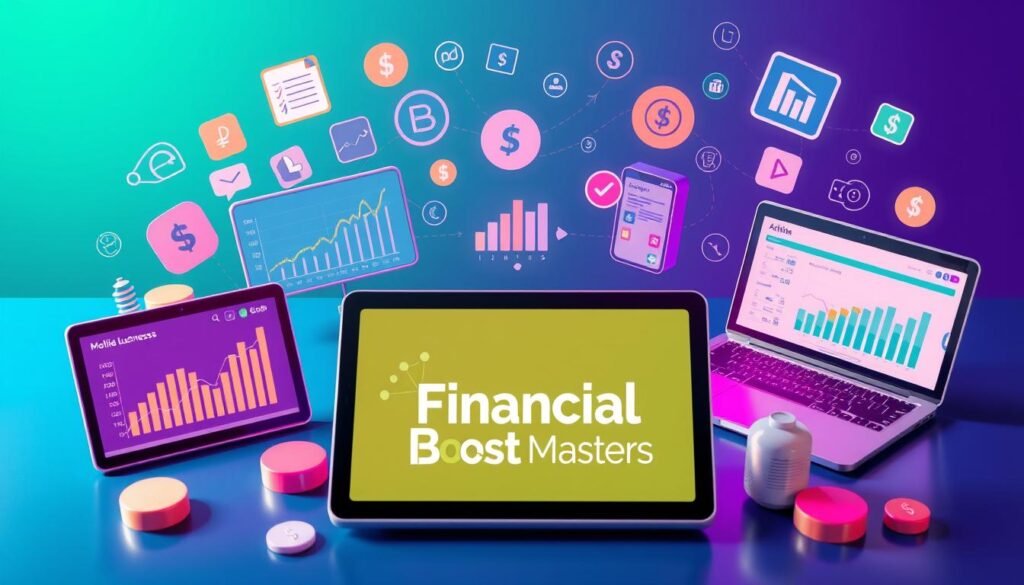
Are you a small business owner looking for financing options? Today, top online lenders for small businesses are changing how entrepreneurs get capital. They offer loans online with flexible terms, unlike traditional banks.
These lenders provide various solutions, from short-term loans to equipment financing. They help both startups and established businesses grow. But, finding the right lender can be tough with so many choices.
We looked at 15 leading lenders, checking 16 key points across 5 areas. Loan amounts range from $1,000 to $1.5 million. Interest rates start at 4.66%, and factor rates at 1.11%.
Whether you need quick cash or long-term financing, knowing online lending is key. There are many options, like SBA loans and invoice factoring. Each has its own benefits and needs. Let’s explore how online lending can help your business grow.
Key Takeaways
- Online lenders offer loan amounts ranging from $1,000 to $1.5 million
- Interest rates start as low as 4.66%, with APRs around 9%
- Repayment terms can extend up to 10 years for some loan types
- Lines of credit typically max out around $250,000
- Equipment financing loans are usually capped at 80%-90% of the equipment’s value
- Credit score requirements vary widely, from 300 for invoice factoring to 700 for some bank products
- Origination fees typically range from 3% to 5% of the total loan amount
Understanding the Importance of Online Lenders
Online lending platforms have changed how small businesses get funding. They make it easier for entrepreneurs to get the money they need. This is great for small businesses in today’s fast world.
Benefits of Using Online Lenders
Online lenders have big benefits for small business owners:
- Quick application process, often under 15 minutes
- Rapid funding, with some lenders offering capital within 24 hours
- Flexible qualification requirements, accommodating newer businesses
- Minimal documentation compared to traditional loans
- Loan amounts ranging from $2,000 to $1 million
How Online Lenders Differ from Traditional Banks
Online lenders and traditional banks serve different needs:
| Feature | Online Lenders | Traditional Banks |
|---|---|---|
| APR Range | 6% – 99% | 3% – 13% |
| Repayment Period | 3 – 60 months | 12 – 84 months |
| Funding Time | 1 – 2 business days | Weeks to months |
| Business Plan Required | Less likely | Often required |
| Collateral | Often not required | Frequently required |
Online lenders are fast and easy to use. Traditional banks offer better rates for well-established businesses. Digital lending is becoming more popular, helping small businesses get the funding they need.
Top Online Lenders for Small Businesses
In the world of fintech small business financing, some online lenders really shine. They offer new ways to get money for entrepreneurs and small business owners. This has changed how businesses get the funds they need.
Overview of Leading Online Lenders
The online lending world is full of variety. Each lender has its own special benefits. Bluevine, for example, gives out term loans up to $500,000 and credit lines up to $250,000.
OnDeck offers term loans from $5,000 to $250,000 and credit limits from $6,000 to $100,000. Funding Circle is known for loans from $25,000 to $500,000. They focus on businesses with good credit.

Pros and Cons of Each Lender
Online lenders are known for being fast and having less strict rules than banks. But, they also have their own good and bad points. Bluevine is quick and offers high credit limits, but you might need to meet strict criteria.
OnDeck can fund you the same day, but some might pay more in interest. Funding Circle lets you pay back over 7 years, but you need a good credit score of at least 660.
| Lender | Pros | Cons |
|---|---|---|
| Bluevine | High credit limits, fast funding | Stricter eligibility |
| OnDeck | Same-day funding options | Potentially higher interest rates |
| Funding Circle | Long repayment terms | Higher credit score requirement |
When picking an online lender, think about how fast they fund, how much they lend, and who they lend to. Your business needs and financial situation will help you choose the best fintech small business financing option.
Loan Types Offered by Online Lenders
Online lenders offer many financing options for small businesses. These loans meet different needs and situations. Let’s look at the main types available.
Short-Term Loans
Short-term loans give quick cash for urgent needs. They usually range from $5,000 to $500,000. Repayment terms are 3 to 36 months.
Interest rates start around 8% but can be higher. This depends on your credit profile.
Line of Credit Options
Online business line of credit lenders offer flexible financing. You can borrow up to a set limit. Only pay interest on what you use.
Credit lines often range from $10,000 to $250,000. APRs start at 4.66%.
Equipment Financing
This loan type helps you buy business equipment. Lenders finance 80% to 90% of the equipment value. Terms range from 1 to 5 years.
Interest rates start around 5%.
| Loan Type | Amount Range | Typical Terms | Starting Interest Rate |
|---|---|---|---|
| Short-Term Loans | $5,000 – $500,000 | 3 – 36 months | 8% |
| Line of Credit | $10,000 – $250,000 | Revolving | 4.66% |
| Equipment Financing | 80-90% of equipment value | 1 – 5 years | 5% |
Choose the loan type that fits your business needs and financial situation. Remember to compare offers from multiple lenders. This way, you can get the best terms.
Eligibility Requirements for Online Loans
Getting small business loans online can be a big help for startups and established companies. It’s important to know what you need to qualify. This way, you can increase your chances of getting approved by the best online lenders for startups.
Common Criteria Across Lenders
Online lenders check a few main things when they review your loan application:
- Credit scores: While traditional banks often require scores of 690+, some online lenders accept scores as low as 500.
- Annual revenue: Requirements vary widely, from $36,000 to $250,000+.
- Time in business: Online lenders may approve loans for businesses operating for just six months, while banks usually require two years.
- Debt service coverage ratio: A ratio above 1.25 is ideal to show you can cover debt obligations.
| Lender Type | Min. Credit Score | Min. Annual Revenue | Min. Time in Business |
|---|---|---|---|
| Online Lenders | 500-625 | $36,000-$100,000 | 6 months |
| Traditional Banks | 670+ | $150,000-$250,000 | 2 years |
Improving Your Chances of Approval
To boost your chances of getting small business loans online, try these tips:
- Build your business credit score
- Maintain strong cash flow
- Prepare detailed financial documents
- Develop a clear business plan
- Offer collateral for secured loans
Some of the best online lenders for startups might look at other data for newer businesses. By knowing what they want and improving your application, you’ll have a better shot at getting the funding your business needs.

The Application Process Explained
Getting ready for digital lending for entrepreneurs is easy with the right steps. Fintech small business financing has made it simpler. This way, you can get the funds you need without hassle.
Steps to Apply for an Online Business Loan
The application process has five main steps:
- Gather necessary documents
- Complete the online application form
- Submit financial statements and business information
- Undergo a credit check
- Review and accept loan terms
Online lenders are often faster than traditional banks. They can approve and fund your loan in the same day. This makes digital lending a quick fix for urgent financial needs.
Documentation Needed for Your Application
For fintech small business financing, you’ll need a few documents:
- Business and personal tax returns
- Bank statements (typically for the past 3-6 months)
- Profit and loss statements
- Business licenses or registrations
Online lenders usually want businesses to be at least six months to one year old. They also look for a minimum annual revenue of $50,000 to $250,000. Your credit score is important too, with most lenders preferring scores of 690 or higher.
Having these documents ready and meeting the basic requirements can help. It makes your application process smoother and increases your approval chances.
Interest Rates and Fees: What to Expect
When looking for alternative online business funding, it’s key to understand interest rates and fees. Non-bank online business loans have different costs. Here’s what you need to know about rates and possible hidden fees.
Factors Influencing Interest Rates
Online business loan interest rates vary from 6% to 99%. Several factors affect these rates:
- Credit score
- Business revenue
- Time in business
- Loan type
- Market conditions
For instance, SBA loans have rates from 10.75% to 15.75%. Merchant cash advances can go up to 350%.
| Loan Type | Interest Rate Range |
|---|---|
| Bank Loans | 6.42% – 12.41% |
| Online Term Loans | 6% – 99% |
| SBA Loans | 10.75% – 15.75% |
| Business Lines of Credit | 10% – 99% |
| Equipment Financing | 4% – 45% |
Hidden Fees to Watch Out For
There are extra costs beyond interest rates that can increase your loan cost:
- Origination fees (3% to 5% of loan amount)
- Late payment fees
- Prepayment penalties
- Processing fees
- Draw fees for lines of credit
- Annual maintenance fees
Some lenders use factor rates, making it hard to compare costs. Always check the fine print and ask about all fees before agreeing to a loan.

To get the best rates, improve your credit score and offer collateral. Consider adding a cosigner and have a solid business plan. The right loan can help your business grow without financial strain.
Customer Service and Support
When looking at online lending platforms for SMEs, great customer service is key. Digital lending has changed how entrepreneurs get capital. But, understanding loan terms and payments can be tricky.
Importance of Good Customer Service
Good support helps solve problems fast and explains complex loans. Lenders like Sunwise Capital find the best deals for clients. This shows how important quick and helpful customer care is.
How to Evaluate Lender Support Options
To judge a lender’s support, look at these points:
- Available communication channels (phone, email, chat)
- Support hours (business hours vs 24/7)
- Response times
- Dedicated account managers
- Educational resources
For example, Pursuit made 785 loans worth $309 million in 2023. They offer SBA loans, showing strong support. Kiva also offers microloans with no credit score needed, helping many borrowers.
“Understanding terms, interest rates, and collateral requirements is important, emphasizing the importance of credit score.”
Good customer service does more than fix problems. It helps you make smart choices for your business’s money future.
Reviews and Ratings of Top Online Lenders
When looking for the best online lenders for startups or small businesses, reviews and ratings are key. They help you make smart choices about your financial future. Let’s look at how to find and use this important info.
Resources for Finding Customer Reviews
To get feedback on top online lenders for small businesses, check out these trusted places:
- Trustpilot
- Better Business Bureau (BBB)
- Google Reviews
- Industry-specific review sites
For example, BlueVine is a well-known online lender with a 4.3 rating on Trustpilot from 8,100 reviews. This shows they’re highly rated for customer satisfaction and service quality.

Analyzing Lender Reputation
When picking the best online lenders for startups, look at these things:
- Overall ratings across platforms
- Complaint resolution processes
- Consistency of positive feedback
- Customer service quality
- Transparency in loan terms
Watch out for lenders with many unresolved complaints or consistently low ratings. For example, Capchase is a top lender with a high FAB score of 375 and lots of website visits. This shows they keep customers happy and engaged.
“Choose a lender with a solid reputation and positive customer experiences to ensure a smooth borrowing journey for your small business.”
Doing thorough research with these tools will help you find the best online lender for your small business needs.
Comparing Loan Offers Effectively
When looking for small business loans online, it’s key to compare offers carefully. Knowing important metrics and using comparison tools can help you find the best deal. This is true for online business line of credit lenders.
Key Metrics to Consider
When evaluating loan offers, focus on these key factors:
- Annual Percentage Rate (APR)
- Total borrowing cost
- Repayment terms
- Funding speed
Watch out for hidden fees. A $500,000 loan might seem good with a 2% “discount.” But, you might only get $490,000 because of hidden charges. For a $100,000 loan over one year with a 15% discount rate, you’d get $85,000 but have to repay $100,000.
Utilizing Comparison Tools
Online platforms can make finding the right loan easier:
- Lendio connects you with many lenders, allowing you to apply at once
- Biz2Credit offers a quick 5-minute application, with funding options in 24 hours
- The BizAnalyzer tool helps check your financial health, including cash flow and credit scores
These tools make comparing loans easier. They help you find the best small business loans online or online business line of credit lenders fast and efficiently.
Conclusion: Choosing the Right Online Lender
Finding the right online lender is key for your small business in today’s market. With fintech financing, you have many choices. Think about the lender’s reputation, loan terms, and if they meet your business needs.
Tips for Making the Final Decision
Compare offers from different lenders to make a smart choice. In 2021, 34% of small businesses tried traditional financing but only 31% got all the funds they needed. This shows why looking into alternative online business funding is important. Look for lenders with good rates and consider more than just your credit score.
The Future of Online Lending for Small Businesses
The world of online lending is changing fast. With new tech, expect quicker approvals and loans tailored to you. In 2021, 23% of small businesses chose online lenders, and this number is likely to rise.
Stay updated on new rules that could affect fintech financing. This way, you can get the best funding for your business.


